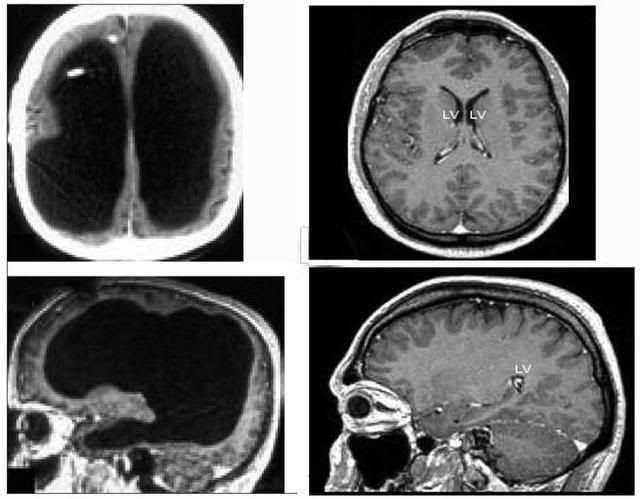| FAQ/Help |
| Calendar |
| Search |
| Today's Posts |
 |
|
| Epilepsy For support and discussion about Epilepsy and Seizure Disorders. |
advertisement
| Reply |
|
|
Thread Tools | Display Modes |
 |
|
| Epilepsy For support and discussion about Epilepsy and Seizure Disorders. |
| Reply |
|
|
Thread Tools | Display Modes |
|
|
#1 | |||
|
||||
|
Junior Member
|
Source
Man with tiny brain shocks doctors A man with an unusually tiny brain manages to live an entirely normal life despite his condition, which was caused by a fluid build-up in his skull. Scans of the 44-year-old man's brain showed that a huge fluid-filled chamber called a ventricle took up most of the room in his skull, leaving little more than a thin sheet of actual brain tissue (see image, below. Patient's brain on the left, a normal brain is on the right).  It is hard for me [to say] exactly the percentage of reduction of the brain, since we did not use software to measure its volume. But visually, it is more than a 50% to 75% reduction, says Lionel Feuillet, a neurologist at the Mediterranean University in Marseille, France. Feuillet and his colleagues describe the case of this patient in The Lancet. He is a married father of two children, and works as a civil servant. Not retarded The man went to a hospital after he had mild weakness in his left leg. When Feuillet's staff took his medical history, they learned that, as an infant, he had had a shunt inserted into his head to drain away hydrocephalus water on the brain. The shunt was removed when he was 14. But the researchers decided to check the condition of his brain using computed tomography (CT) scanning technology and another type of scan called magnetic resonance imaging (MRI). They were astonished to see "massive enlargement" of the lateral ventricles usually tiny chambers that hold the cerebrospinal fluid that cushions the brain. Intelligence tests showed the man had an IQ of 75, below the average score of 100 but not considered mentally retarded or disabled. "The whole brain was reduced frontal, parietal, temporal and occipital lobes on both left and right sides. These regions control motion, sensibility, language, vision, audition, and emotional and cognitive functions," Feuillet told New Scientist. Brain adaptation The findings reveal "the brain is very plastic and can adapt to some brain damage occurring in the pre- and postnatal period when treated appropriately," he says. "What I find amazing to this day is how the brain can deal with something which you think should not be compatible with life," comments Max Muenke, a paediatric brain defect specialist at the National Human Genome Research Institute in Bethesda, Maryland, US. "If something happens very slowly over quite some time, maybe over decades, the different parts of the brain take up functions that would normally be done by the part that is pushed to the side," adds Muenke, who was not involved in the case.
__________________
. "If you are going through h e l l, keep going." (Sir Winston Churchill, 1874-1965) C'est la vie! Work like you don't need money, Love like you've never been hurt, And dance like no one's watching. |
|||
|
|
 Reply With Quote Reply With Quote
|
| Reply |
|
|
 Similar Threads
Similar Threads
|
||||
| Thread | Forum | |||
| You are all invited to my tiny documentary preview | Community & Forum Feedback | |||
| Tiny Helpful Hints to get through the day | Parkinson's Disease | |||